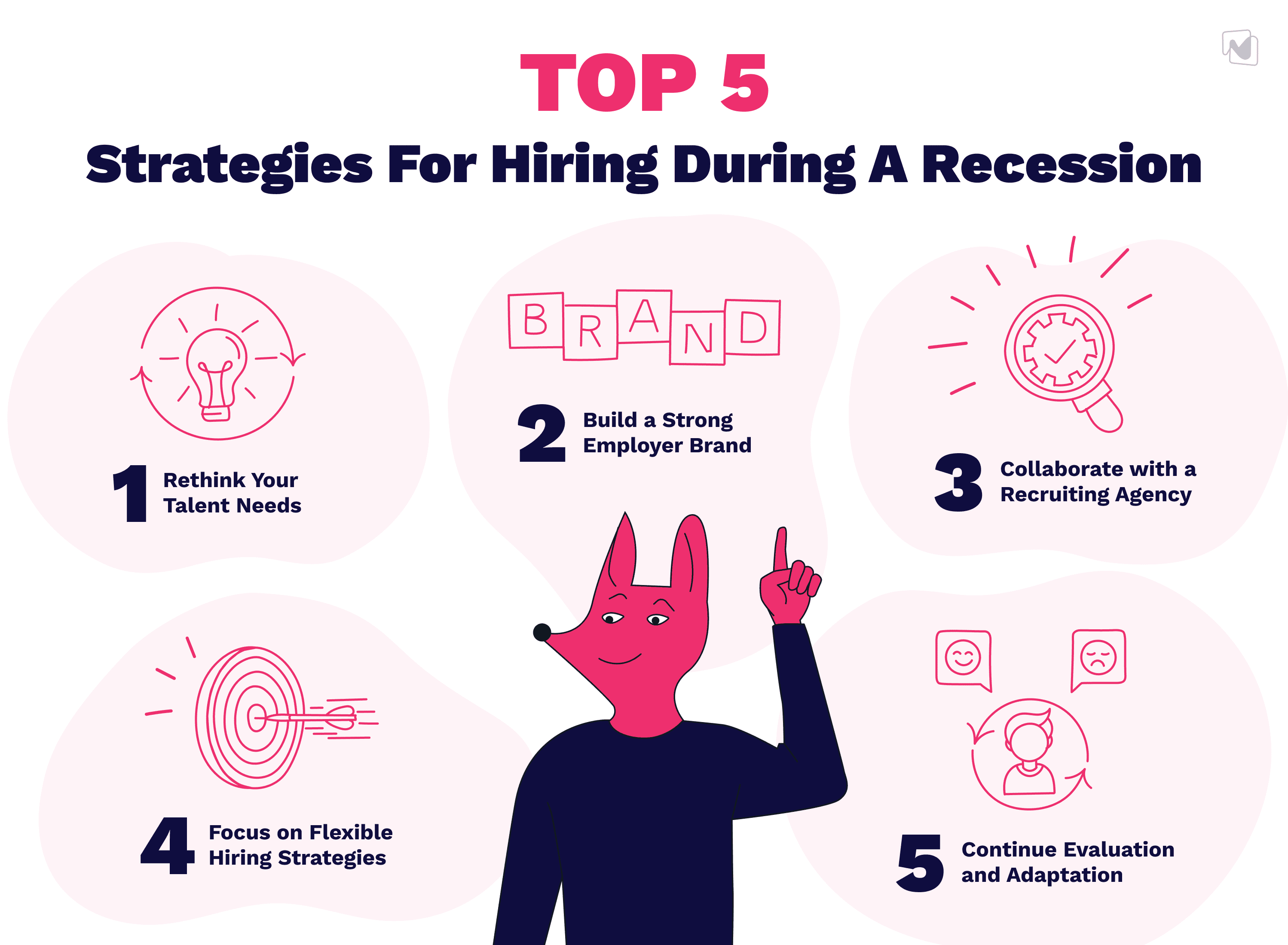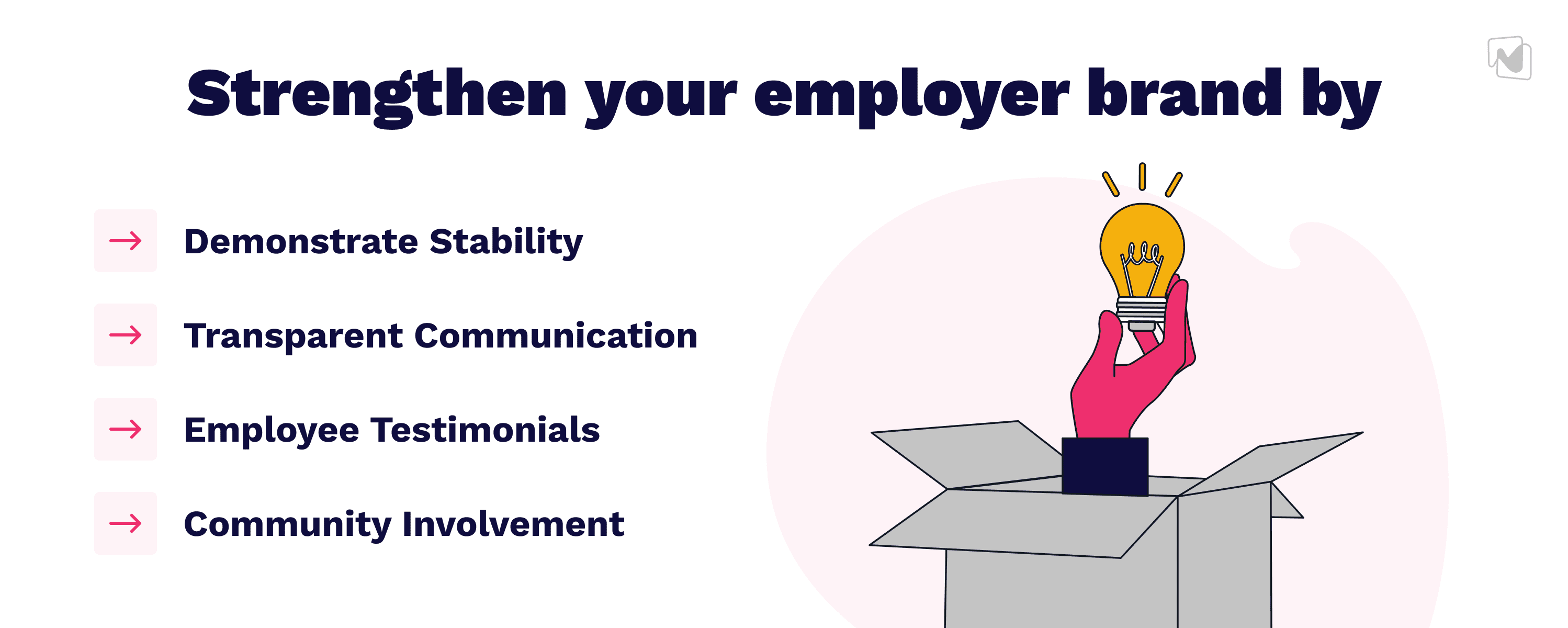Managing Hiring During a Recession: Strategies for Talent Acquisition
Hiring during a recession becomes one of the most challenging aspects for businesses. While cost-cutting measures and layoffs may dominate the headlines, smart organizations understand that they must continue to invest in their workforce to ensure long-term success and retain active job seekers.
Talent acquisition during a recession is a delicate balancing act that requires strategic planning and focusing on both short-term needs and long-term goals. This article will explore effective strategies for handling human resources acquisition during a recession, keeping in mind the concerns of many job seekers.

Understanding the Impact of Economic Recessions on Hiring
Economic recessions, characterized by a substantial decline in economic activity, leave an indelible mark on various facets of the economy. Key indicators of recessions include a contraction in Gross Domestic Product (GDP), a surge in unemployment rates, and a noticeable decline in consumer spending.
These downturns can be triggered by an array of factors, including financial crises, external shocks, or systemic issues within the economy.
During a recession, the adverse effects ripple through the business landscape, particularly impacting hiring decisions. Hiring managers and business leaders must confront the stark realities of a downturn that severely curtails economic activity.
To provide context, let's examine some examples and statistics to illustrate the profound influence of recessions on hiring:
The Great Recession of 2008-2009
The Great Recession, triggered by the collapse of the housing market and the subsequent financial crisis, had a substantial impact on employment. Many industries, especially those closely tied to the housing sector, experienced massive layoffs.
According to the U.S. Bureau of Labor Statistics, the unemployment rate in the United States peaked at 10% in October 2009, and over 8 million jobs were lost during the recession.
Related: Software and Tools to Improve Your Online Recruitment
COVID-19 Pandemic-Induced Recession (2020)
The COVID-19 pandemic brought about a global economic downturn that severely affected various sectors. Industries such as hospitality, tourism, and retail experienced drastic declines in revenue, leading to widespread hiring freezes and layoffs.
A report by the International Labour Organization (ILO) estimated that the equivalent of 255 million full-time jobs were lost globally in 2020 due to the pandemic.
In response to these challenging economic conditions, many companies find themselves compelled to implement hiring freezes, reduce their workforce, or undergo a comprehensive reevaluation of their hiring strategies. These measures are essential for adapting to the evolving economic landscape.
In the upcoming sections, we will delve into specific strategies for effectively managing talent acquisition during a recession, with a focus on attracting and securing qualified candidates.

Top 5 Strategies For Hiring During A Recession
In our exploration of how economic downturns impact hiring, we've emphasized the need for adaptability. Now, we dive into concrete strategies. These tactics are designed to help you secure the qualified and quality candidates essential for success in challenging economic times.
From reevaluating talent needs to strengthening your employer brand, collaborating with recruiting agencies, embracing flexible hiring, and maintaining continuous adaptation, each strategy is a crucial piece in the puzzle of building a resilient and high-performing workforce.
Let's embark on this journey together, armed with the knowledge and strategies needed to excel in the face of economic adversity.
1. Rethink Your Talent Needs
Before you begin the talent acquisition process, it's crucial to reassess your organization's actual talent needs. In a recession, every hire should be mission-critical.
Start by examining your current workforce and identifying gaps in skills and competencies. Are there essential roles that need to be filled immediately, or can some positions be temporarily put on hold? Prioritize hiring based on the roles that will significantly impact your company's recovery and growth.
2. Build a Strong Employer Brand
In a competitive job market, your employer brand becomes more critical than ever. Potential candidates will likely investigate your organization's reputation, culture, and stability before considering a job offer.

Use this time to strengthen your employer brand by:
- Demonstrate Stability: Highlight your company's ability to stay strong and your long-term vision, showcasing how you've successfully navigated past economic challenges.
- Transparent Communication: Keep candidates informed about your company's current situation and future prospects. Transparency builds trust.
- Employee Testimonials: Encourage your current employees to share their positive experiences working for your organization. Authentic testimonials can be powerful tools for attracting the right candidate.
- Community Involvement: Engage in community initiatives and corporate social responsibility efforts to demonstrate your commitment beyond profits.
3. Collaborate with a Recruiting Agency
Recruitment agencies bring a wealth of expertise and experience to the table. They specialize in understanding the job market, industry trends, and the unique dynamics of employee procurement during a recession. By collaborating with a recruitment agency, your organization can align its talent acquisition strategy with proven methodologies and insights.

Working with a recruiting agency offers several advantages:
- Expertise: Agencies specialize in talent acquisition and understand the nuances of the job market. They can provide insights, strategies, and market intelligence that may not be readily available in-house.
- Access to Talent: Recruitment agencies have vast networks of potential candidates, increasing your chances of finding the right fit quickly.
- Efficiency: Agencies streamline the hiring process, reducing the time to fill crucial positions.
- Cost Savings: Contrary to common misconceptions, partnering with a recruiting agency can be cost-effective when considering the long-term benefits and risk mitigation.
Read more: 7 Tips on Developing a Talent Sourcing Strategy And Why You Need One
4. Focus on Flexible Hiring Strategies
Recessions often demand flexibility in your hiring strategies. Consider alternatives such as part-time positions, temporary contracts, freelancers, or gig workers. These arrangements can help you access new talent without committing to long-term employment contracts.
Additionally, be open to remote hiring, which has gained prominence due to the COVID-19 pandemic. Remote employee procurement expands your reach to a broader geographical pool and can lead to significant cost savings.
5. Continue Evaluation and Adaptation
Talent acquisition during a recession is an ongoing process. Continuously monitor and adapt your recruitment strategies based on key performance indicators (KPIs) like time-to-fill, cost-per-hire, and candidate quality. Regularly assess the effectiveness of your efforts and be prepared to make adjustments as needed to stay agile and responsive to changing market conditions.
Conclusion
Navigating talent acquisition during a recession is undoubtedly challenging, but it's also an opportunity for organizations to set themselves up for future success. MagicHire, your trusted IT recruiting partner, can help you seize this opportunity.
By rethinking talent needs, building a strong employer brand, leveraging technology, and focusing on transferable skills, businesses can weather the storm and emerge stronger on the other side. With a strategic and adaptable approach, employee engagement becomes a key driver of recovery and growth during challenging economic times, and MagicHire can guide you on this journey.
In conclusion, remember that in the midst of uncertainty, talented individuals still seek opportunities, and organizations that can effectively attract and retain this talent will be better positioned to thrive when the economy rebounds. Let MagicHire be your partner in building a robust talent pipeline for a brighter future.

FAQ
What is the impact of an economic downturn on the hiring process?
During an economic downturn, the hiring process can become more challenging due to reduced budgets and increased competition for available top talent. Employers may need to adapt their strategies to navigate the changes in the job market effectively.
What strategies can companies use to navigate the job market during a recession?
Companies navigating a recession can ensure job security by upskilling current employees, promoting from their internal talent pool, and, if necessary, conducting targeted layoffs to cut costs. They can also consider job postings for temporary or contract workers to flexibly manage workforce needs.
How does the recruiting process change during a recession?
The recruiting process during a recession may require adjustments to accommodate the economic climate. Companies might implement cost-effective hiring strategies, streamline their recruitment processes, and place a stronger emphasis on hiring for essential roles while freezing non-essential positions.
How does the candidate's market impact talent acquisition during a recession?
The candidate's market refers to a situation where there are more job openings than there are qualified candidates available.
During a recession, this scenario can be advantageous for employers, as it provides a larger talent pool to choose from. It's an opportunity to find well-qualified candidates who may have been previously hard to attract.
What are passive candidates, and why are they important during a recession?
Passive candidates are individuals who are currently employed and not actively seeking new job opportunities. They are valuable during a recession because they often possess the skills and experience that can be crucial for your organization's growth.
By targeting passive candidates, you tap into a pool of potentially top talent who may not be actively looking but could be open to the right opportunity.






